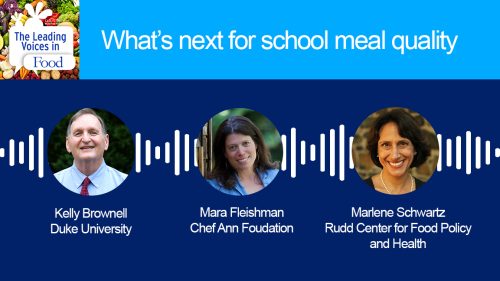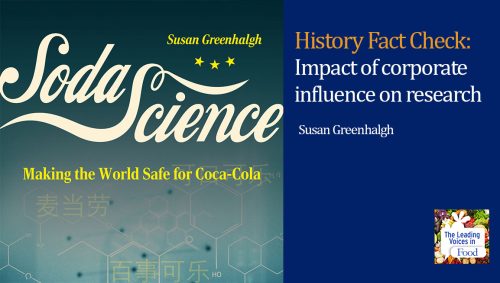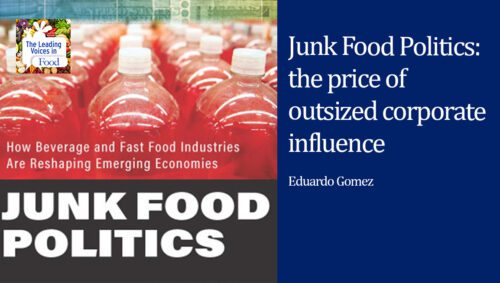The Leading Voices in Food
E42: Jim Krieger on the Making of a Soda Tax
Let’s say that you are a public health advocate and would like to see a tax on sugar sweetened beverages established in your community. What steps would you take? What coalitions do you think you’d need to build. And how would you go about the extraordinary work of gathering support from both the public and political figures? Few people are in a position to tell the story in such a compelling way as today’s guest Dr. James Krieger, who joins us from Seattle–one of the many places in the world that now has such taxes.
Subscribe: Apple Podcasts | TuneIN | YouTube Music | SoundCloud | PocketCasts | Radio Public
Tags: Childhood Obesity | Food Industry Behavior & Marketing | Food Policy | Obesity | Soda Taxes |

James Krieger is the founding executive director of Healthy Food America and is a clinical professor at the University of Washington Schools of Medicine and Public Health. Prior to that position, he served as chief of the Chronic Disease and Injury Prevention Section for the Seattle King County Department of Public Health. He is a physician and an expert in public health, and is recognized widely for his work on policies around school nutrition menu labeling, increasing access to healthy foods, and sugary drink taxes.
Interview Summary
So Jim, you’ve been a very important figure in this issue with sugar sweetened beverage taxes, not only in Seattle but elsewhere around the country, and in the world. But before we dive in with that topic in particular, can you tell us a little bit about your organization, Healthy Food America?
Sure Kelly, and thanks for inviting me to join you on this podcast. Healthy Food America is a nonprofit organization that provides research and public education, raises awareness about issues of healthy food policy, and reducing exposure to unhealthy foods in communities across America. And we’re particularly interested in improving health equity in terms of diet quality and disease outcomes related to nutrition related illnesses.
By the way, I urge our listeners to visit your website because it’s just rich with information on these various issues you tackled, especially sugar sweetened beverage taxes. So let’s, let’s turn our attention to that issue, the taxes. So let’s turn our attention to sugary drink taxes. And let me begin by asking a pretty broad question. What did it take to get a tax passed in Seattle?
Well you know the tax in Seattle or anyplace else is not something just pops up overnight. It may look like that from the outside but in Seattle, as elsewhere, it takes years of ground work to successfully develop and win a tax adoption campaign. And during those years where things are kind of quiet and moving behind the scenes, all sorts of things are happening. Coalition development is a key element of this phase where people come together from the public health sector, from the community sector, from the government sector, and figure out exactly why they want a sugary drink tax, what problem is it going to address in their communities and how do they go about crafting a policy that meets those community needs. It also is a question of waiting for the right moment. There has to be a window of opportunity to win a policy where there’s broad recognition among elected officials and the public and community-based organizations and communities that there is a problem, that a tax ready to fix. And there needs to be the right people in place to make that happen, particularly leaders in the community who are willing to put some energy into making it happen, as well as elected officials who will be the champions to take the tax policy and move it through the legislative process. And the only other thing I think that really is important in this early phase is assuring that there’s adequate funding for the campaign because these campaigns cost money to run and win. And so lining up funders, both local and national, is pretty important. But I think to summarize all that, I think you really need to take the time upfront to engage with communities, particularly those communities that are most effected by sugary drink consumption, and those chronic diseases that are caused by consumption, and make sure that the leaders of those communities are on board and excited about working towards this policy goal.
So do you believe there’s any benefit to the just having the debate itself on the taxes that’s irrespective of whether the tax passes or not?
Yeah, I think there probably is because in effect, having a debate on the taxes becomes a free media campaign or public awareness campaign. Whenever the tax is discussed, it inevitably comes down to questions of why these products should they be taxed and what are their health consequences? So that’s a great way to raise awareness in the public in general, whether or not the tax succeeds. I think that’s actually an interesting question, which would be interesting to try to get more rigorous research to evaluate what the impact of the awareness raising prior to tax adoption is on consumption and attitudes about sugary drinks.
So how large is the tax in Seattle and what’s tax on? What do you see so far in terms of effectiveness?
So in Seattle, our tax is on the higher range of the taxes that have been adopted in the US at 1.75 cents per ounce. The tax is levied on the distributors of sugary drinks, and those include everything from sodas to sports drinks, and energy drinks, to sweetened coffees and teas to fruit drinks. The tax is generating substantial revenues in Seattle. Close to, we estimate, $23 million in the first year. And so from a revenue collection perspective, the tax has been quite successful. The tax has also effectively increased the shelf price of the taxed products in Seattle almost a hundred percent, 97% to be precise across all beverage categories. So the tax is performing as anticipated. We haven’t had a lot of feedback from the distributors that’s difficult for them to comply with tax collection. We don’t know yet if there is much tax avoidance going on, that is something that’s under consideration right now. But given the amount of revenues that are coming in, it does not seem to be a major problem. And there really hasn’t been very much opposition, pushback or concern raised either by the beverage industry or by others in our community. Perhaps because people realize that the revenues in Seattle are going to support things that people care about: access to healthy food for low income people and support for families with very young children age zero to three in terms of early education support.
When you talk about tax avoidance are you talking about people leaving the area where the tax occurs and buying their soda elsewhere?
Yeah, exactly. There’s concern raised that people will cross the border from any city that has a tax and shop outside to avoid tax. And while that’s theoretically a possibility any place, in Seattle, from the initial data that we have, it doesn’t look like that’s happening much which might be because the Seattle’s specific geography. We’re a city bounded by big bodies of water on the east and west, and it’s only small areas in the north and south that are connected with other communities. So there aren’t that many physical borders that are easy to cross to shop at. We’re seeing more cross border shopping if you look at a place like Philadelphia, which has border pretty much on all sides. And so I think, how much of that cross border shopping really is going to be a city by city consideration. The other area of tax avoidance is whether businesses are paying the taxes required and it seems like they are.
So how are the revenue is being used? And do you believe that how they’re used affects public opinion about the usefulness of the tax?
Yeah, I think that for some people who support the tax, the revenue use is the most important justification or rationale for the tax. Even more than reducing consumption. I think some people who are particularly concerned about health equity, view the equitable investment of revenues that they’re invested in those communities that are disproportionately targeted by predatory industry marketing practices, communities where exposure to sugary drinks is high because they’re available everywhere and therefore consumption is high. If revenues are invested in those communities to address important community needs and health inequities, then that’s considered a very important goal for the taxes. I’m just going to give some examples of how the revenues are being used in cities across the nation. So I mentioned in Seattle we are very heavily investing in providing subsidies so low income people can have subsidized purchases of fresh fruits and vegetables, whether at grocery stores or farmer’s markets. Other communities are also doing that.
In Seattle, as I mentioned, we’re investing in early education by providing home visiting services and subsidized childcare slots and Philadelphia is doing that also. That’s their primary focus and doing significant investments, creating literally thousands and thousands of a subsidized childcare slots for low income people in Philadelphia. Other communities are working on preventing chronic diseases like diabetes. They’re doing education around the health effects of sugary drinks. They’re putting hydration stations in public places or schools. They’re promoting oral health access. They’re supporting community gardening programs. They’re supporting physical activity recreation programs in parks and rec centers. And they’re even supporting high school completion and graduation programs and support for kids going to the community colleges. So it’s a wide range of programs, which I think illustrates that each community knows what it needs and knows the best used to put those revenue towards.
Well it’s nice to hear the various examples, and my instincts are the same as yours that ultimately, whether these taxes will be accepted and expanded in various places will be determined by how the revenue is being used. And it’s nice that various localities are doing things that fit their own needs. And it will be interesting to see that story going forward. Now one thing I wanted to ask, Jim, you mentioned earlier that it takes money to run these campaigns. And I’m assuming one of those reasons is because industry is spending so much money is to oppose the campaign. So what are some of the things that you’ve seen in the industry do to help stop these taxes?
So industry is really fully engaged in all out war against these taxes. I should say I actually used this word, Kelly, at one point, that they view them as an existential threat to their existence. And it’s probably their number one public policy agenda item is to block sugary drink taxes. So they will spend literally millions and millions of dollars to oppose a tax campaign, when it’s launched, you know, upwards of $20-30 million in any particular location. If it’s a big city, they will selectively use the research findings to try to make the case that taxes don’t work. They will fund their own research to try to show the taxes are having negative consequences on jobs and small business revenues. They’ll create what are called astroturf coalitions, fake coalitions that they provide the money for. And then put other’s up to be the front people for them to try to suggest that there’s community opposition to these taxes when the opposition is really being generated by industry. Perhaps most concerning is the move that they are now making to preempt taxes. Preemption means the state government passes a law that prevents local governments from acting. In this case from enacting a sugary drink tax. And the industry is aggressively promoting preemption legislation in states across the country to try to block local governments from passing taxes.
It’s a script that is remarkably familiar because of the tobacco companies doing almost precisely the same things. And in the case of the tobacco companies, they had some temporary success in stalling or blocking public health activities, but ultimately they got hit big time. And I wonder whether the soda companies aren’t in for the same thing. What are your thoughts on that?
I mean, I think they are. And I think despite the intense level of industry opposition, it’s interest in sugary drink taxes remains strong. And what I think we’ll be seeing actually is adoption in the next few years of these taxes at the state level. So far, all the action in the US has been at the local level. The state level is immune from preemption and covers a much larger population and therefore the cross border shopping issues we talked about before are more muted at that level. So I think just like you said, we will see continued progress in this despite the industry opposition just like we did in tobacco. Industry is not going to give up easy. They’re going to try where they can to even repeal existing taxes. We’re seeing right now as the Philadelphia primary election season approaches, that industry is inserting itself heavily, even in local politics in Philadelphia, supporting council candidates who oppose taxes and opposing candidates who have supported taxes as well as the mayor. But when I talk to folks in Philadelphia they think any efforts to repeal the tax in Philadelphia are dead on the start because people are so supportive of the way of monies, the revenues are being invested in Philadelphia. And there is no alternative revenue sources to support this Pre-K and community schools and parks and rec programs.
Are there unintended consequences of the taxes?
Well, I think that’s always an important question to ask about any policy. This one included. One of the unintended consequences that’s brought up by both industry and by some progressives as well, is whether the tax places a regressive burden on low income households. Meaning, do poor people in income households pay a greater percent of their household income on taxes than wealthier people. And I think by definition, yes that’s going to be true. But the question is how much is that? Is it $100 a year or $20 a year or $10 a year per house? So, I think we need the answer to that question. That hasn’t been done yet. We’re actually embarking on some research to try to answer that question. And I think any household level effects need to be balanced by the benefits that those same low income households receive from the revenues we’ve been talking about.
They’re going to programs that benefit low income people, whether it’s paying for childcare or providing subsidies so low income people can buy food. So on balanced is the tax policy regressive in terms of allocation of more revenues to low income communities. And I think we’ll try to get the answer to that question as well. Two other areas where industry keeps talking about unintended consequences where there’s no evidence at this at this point. One is job loss. Industry claims that that because sales will go down, jobs will be lost. However the most objective peer reviewed studies like one in Mexico published recently shows that there’s been no effect on employment rates in Mexico generally in the affected sectors. And, and data from unemployment claims in Berkeley show similarly that it hasn’t been the effect of the tax in Berkeley on employment in the food sector. In terms of small business revenues and small businesses not being able to make an or go out of business, industry claims that all the time. Again, there’s zero objective evidence for that at this point, but I think it merits further study and there are studies in the field look at that.
Well, Jim when I introduced you, I promised people would be hearing one of the most comprehensive views of the subject that anybody could have and you delivered. So thanks so much for joining us today and congratulations for what you have accomplished. I look forward to seeing even more, and again, I invite our listeners to visit your website at Healthy Food America.









